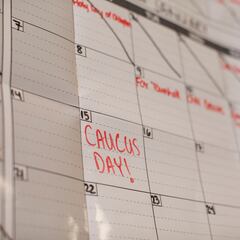Why is Iowa so important for US presidential elections?
Great importance is placed on how a candidate performs in the Iowa caucuses. But why is this state with a small electorate population given such importance?

Republican voters in Iowa will be heading to their local caucuses to choose their favored GOP candidate in the 2024 presidential elections, kicking off primary season. The Iowa caucuses traditionally mark the beginning of the presidential primary process, making it a crucial battleground for presidential hopefuls.
Since 1976, Iowa is the first state to hold caucuses during the Republican presidential primary season. That was four years after Democrats had made a change to their own primary calendar after the tumultuous 1968 Democratic convention in Chicago. The party sought to open the process to more grassroots activists and lessen the power of party leaders.
There was a slight change for this year though as the national Democratic party chose to delay its primary in the state until 5 March, giving ‘First in the Nation’ honors to South Carolina, which will cast ballots 3 February. This was in recognition of the greater diversity that is present in the state and because its voters are more moderate.
Since Biden is the incumbent president, it is considered a forgone conclusion that he will lead the Democratic party ticket. On the Republican side, while former President Donald Trump is far-and-away the front-runner for the GOP ticket, his contenders have still put great effort into courting Iowan voters.
With the odds seemingly stacked up against them, what are they hoping to achieve and why do they see the Iowa caucuses as so important?
"If she beats DeSantis in Iowa, that'll be the end of DeSantis' campaign."
— Frank Luntz (@FrankLuntz) January 13, 2024
I shared the @AC360 screen with Howard Dean to discuss how the Ron DeSantis vs. Nikki Haley battle in the #IowaCaucus could shape the rest of the GOP primary. pic.twitter.com/M8y1YE1yRI
Why is Iowa so important for US presidential elections?
A victory or strong showing in Iowa and/or the “Second in the Nation”, New Hampshire, can be a boon for a presidential candidate’s chances in subsequent primary elections especially in the run-up to Super Tuesday, 5 March, when the greatest number of states will hold their primaries.
Although the first two states only represent a small portion of the American electorate, candidates spend months visiting New Hampshire and Iowa. One must-do for any presidential hopeful is to attend the Iowa State Fair in August before the caucuses. This gives them a chance to build moment and connect with voters.
Related stories
Florida Governor Ron DeSantis looked like the most viable challenger to take on Trump going in to the summer but his campaign has been petering out. Former South Carolina Governor Nikki Haley has moved into second place commanding 20 percent of the vote to 16 percent for DeSantis according to the NBC News/Des Moines Register/Mediacom Iowa final poll before GOP caucuses.
However, Trump still has a nearly 30-point lead over his nearest rival. His support among voters, 48 percent, is slightly lower than the month before when he had 51 percent of the likely vote.

